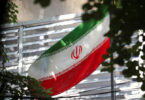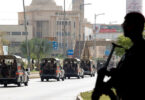Monitoring Desk
TOKYO: Amid increasing worldwide environmental pollution due to plastic waste, a 44-year-old Japanese manager of a development assistance consulting firm in Pakistan’s capital Islamabad recently launched a campaign to create bags and other items from large banners and grocery bags.
Representatives of international organizations in Pakistan and diplomats from various countries appeared on stage carrying colorful bags at a hotel in Islamabad on April 20, two days before Earth Day — an annual event that serves as a reminder about the planet’s environmental issues.
Eri Takagi is the head of the non-profit group “Miracles Trust,” which hosted the event. The so called “miracle bags” are made from plastic banners that would have otherwise been discarded. People involved in organizations that provided the banners served as runway models to show off the new bags.
Miracle bags will be sold and distributed in Pakistan in collaboration with the embassies of various countries, under the co-sponsorship of the United Nations World Food Programme (WFP) and the World Bank. The event marked the beginning of a recycling campaign promoting plastic waste reduction called “Project Miracle.”
With a population of about 200 million people, Pakistan needs urgent measures to tackle plastic waste. The government estimates that people use around 55 billion plastic grocery bags a year and the figure is increasing by 15% each year. Many of these bags are illegally dumped and burnt outdoors, becoming a contributory factor for air pollution.
According to local media, Pakistan’s Ministry of Climate Change announced in May a ban on the use of plastic grocery bags in Islamabad that would come in force by the end of August. It is said that cotton bags will be freely distributed in markets as replacements. But although some provincial governments have already introduced the ban, measures have not led to actual results due to low public awareness of recycling and the lack of alternatives to plastic bags.
Takagaki established a similar flagship project named “Paper Miracles” in 2012 after meeting a woman who suffered partial paralysis in the 2005 Kashmir earthquake. She has supported the financial independence of some 240 people by teaching them how to make accessories from recycled paper. The 44-year-old says she grew an interest in plastic waste issues after seeing large banners used on many occasions at events.
Takagaki came up with the idea to create bags from banners when she temporarily returned to Japan and came across a product made by Swiss bag manufacturer that reuses truck bed covers. She called for cooperation from international organizations, which struggle to deal with large amounts of plastic waste from banners used in events and relief supplies, to launch the recycling campaign.
The United Nations High Commissioner for Refugees (UNHCR) has started to display and sell the bags in front of its office in Islamabad.
Commenting on the movement, United Nations Educational, Scientific and Cultural Organization (UNESCO) Pakistan office representative Vibeke Jensen stated, “We want to advance measures (to tackle environmental issues) at schools and cultural assets.” UNESCO is mulling measures including the distribution of bags made from banners and school supplies in areas of poverty, as well as supporting the independence of women by teaching them how to create daily commodities from grocery bags.
A local subsidiary of major sports equipment manufacturer Nike, Inc. has already stopped the use of plastic grocery bags and is instead beginning to hand out paper bags. In collaboration with the campaign, Nike plans to distribute bags made from banners with the company’s logo to customers who purchase certain amounts of goods, so they can be reused and promote further reductions in plastic waste.
Takagaki stated, “I hope it (the campaign) becomes an opportunity for as many people as possible to know how serious the problem (of plastic waste) is.”
Courtesy: (mainichi.jp)






